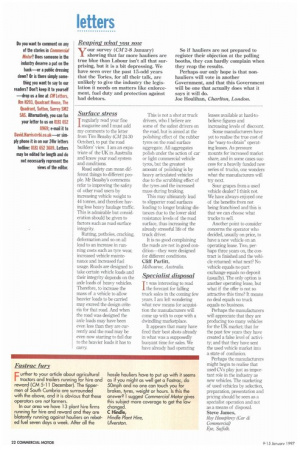Surface stress
Page 24

If you've noticed an error in this article please click here to report it so we can fix it.
Iregularly read your fine magazine and I must add my comments to the letter from Tim Beasby (CM 24-30 October), to put the road builders' view. I am an expatriate of the UK in Australia and know your road system and conditions.
Road safety can mean different things to different people. Mr Beasby's comments refer to improving the safety of other road users by increasing vehicle weight to 44 tonnes. and therefore having less heavy haulage traffic. This is admirable but consideration should be given to factors such as road surface integrity.
Rutting, potholes, cracking, deformation and so on all lead to an increase in running costs such as tyre wear, increased vehicle maintenance and increased fuel usage. Roads are designed to take certain vehicle loads and their integrity depends on the axle loads of heavy vehicles. Therefore, to increase the mass of a vehicle to allow heavier loads to be carried may exceed the design criteria for that road. And when the road was designed the axle loads may have been even less than they are currently and the road may be even now starting to fail due to the heavier loads it has to carry. This is not a shot at truck drivers, who I believe are some of the safest drivers on the road, but is aimed at the polishing effect of the rubber tyres on the road surface aggregate. All aggregates polish under the action of car or light commercial vehicle tyres, but the greatest amount of polishing is by heavy articulated vehicles due to the scrubbing effect of the tyres and the increased mass during braking This may ultimately lead to slipperier road surfaces leading to longer braking distances due to the lower skid resistance levels of the road surface, thus increasing the already stressful life of the truck driver.
It is no good complaining the roads are not in good condition—they were designed for different conditions. Cliff Parfift, Melbourne, Australia.
Specialist disposal
It was interesting to read the forecast for falling truck sales in the corning few years. Jam left wondering what new means for acquisition the manufacturers will come up with to cope with a dwindling marketplace.
It appears that many have fired their best shots already in what was a supposedly buoyant time for sales. We have already had operating
leases available at hard-tobelieve figures and increasing levels of discount
Some manufacturers have yet to realise the true cost of the "easy-to-obtain" operating leases. As pressure mounts for increased market share, and in some cases success for a heavily funded new series of trucks, one wonders what the manufacturers will try next.
Sour grapes from a used vehicle dealer? I think not. We have always enjoyed one of the benefits from not being franchised and this is that we can choose what trucks to sell.
Another point to consider concerns the operator who decided, usually on price, to have a new vehicle on an operating lease. Two, perhaps three years on, the contract is finished and the vehicle returned: what next? No vehicle equals no part exchange equals no deposit (usually). The only option is another operating lease, but what if the offer is not so attractive this time? It means no deal equals no truck equals no business.
Perhaps the manufacturers will appreciate that they are producing too many vehicles for the UK market; that for the past few years they have created a false level of activity; and that they have sent the used vehicle market into a state of confusion.
Perhaps the manufacturers might begin to realise that used CVs play just as important role in the industry as new vehicles. The marketing of used vehicles by selection, preparation, presentation and pricing should be seen as a specialist operation and not as a means of disposal. Steve James,
Roy Humphrey (Car & Commercial) Eye, Suffolk.
































































































